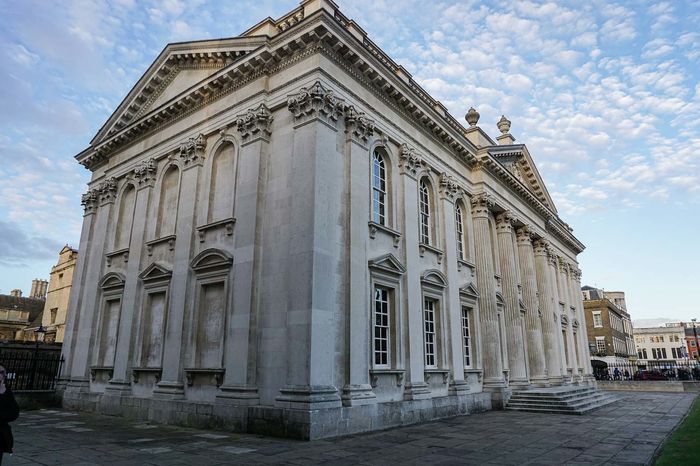27% of Cantabs have parents who attended Oxbridge
The apple doesn’t fall far from Newton’s tree

Over 27% of undergraduates at the University of Cambridge say they have an immediate family member who attended Oxford or Cambridge, a Varsity investigation can reveal.
In a self-selecting online survey of 306 students currently enrolled as Cambridge undergraduates, 27.1% reported having at least one immediate family member who attended Oxbridge for undergraduate studies. By contrast, 14.4% said no one in their family had ever been to university before them.
Of 77 additional respondents who stated they were not current undergraduates, – predominantly comprising alumni, postgraduates, and Oxford students – 50.6% said they had immediate family who attended either university, suggesting legacy families are more common among alumni than among current students.
Taken together, 31.9% of the 382 respondents stated they had a family member who had attended Oxbridge, while 16.9% identified as first-generation students.
Students shared a wide range of experiences with family ties to Oxbridge. One current undergraduate said: “I am the 18th generation Cambridge student in my family. Six of my aunts and uncles went. My grandfathers on both sides went. My sisters and three cousins attend,” while another noted that “It’s super common but people don’t talk about it”. A third recalled being “asked in the first week of uni ‘so what college did your parents go to? ’” when their “parents didn’t even go to uni, let alone oxbridge”.
Another student reflected on how these ties affected their decision to apply: “I defo [sic] think it helped having a sibling go to Cambridge before me – lots of insight into Cambridge and helping me decide that it was a genuine option open to me. If I didn’t have that… I wouldn’t have even thought of applying here.”
Some were struck by the legacy culture only after arriving. “I was so amazed when I arrived at how many students had not only parents, but also grandparents, great grandparents and further relatives who went to not only Cambridge, but even the same college,” one student wrote. “It might sound silly but I genuinely thought that the Cambridge ‘legacy family’ was a thing of the past.”
Another observed: “I have come across quite a [sic] number of people with parents who met at Cambridge, as well as a number with siblings who are/were at Cambridge. It seems that the connection is with Cambridge rather than Oxbridge.”
By contrast, one second-year student with family ties to Oxbridge reflected: “I’ve found that in my freshers everyone was concentrated on what school people went to and more class based things weirdly enough… You come in to Cambridge thinking it is going to be a certain way based on family stories and then you have to reset your expectations based on the reality and how much it has changed 30 years or so on. From my parents experiences, the Uni is very different, particularly academically, to in their day.”
A former applicant reflected on past practices: “When I applied to Cambridge, many years ago now, some colleges actually wrote to applicants asking for details about any family on the alumni… I applied to a college that none of my family had been to and did not get offered a place… while peers who applied to colleges that family had attended or who had had ‘familiarisation dinners’ run by their schools… all did.”
Meanwhile, an alumnus stated: “I think it’s [family connections] more that it gives you the courage to try than any innate advantage. My Dad was at Cambridge, he used to take us there and show us round and take us punting now and again. When I thought about applying we could talk about the reality of it. He was the son of a boilermaker, so no class advantage there!”
Katie Clarke, Access, Education & Participation Officer (UG) at the Students’ Union (SU), told Varsity: “The Varsity survey highlights just how deeply legacy admissions and informal networks remain woven into the fabric of Cambridge. It’s undeniable that multi-generational Oxbridge families often approach both the application process and university life with a significant head start. The quiet power of family familiarity with elite institutions still undoubtedly casts a shadow over our admissions system and student experience.
“Success at Cambridge is often shaped by a layer of unspoken, untaught knowledge, from choosing niche subjects to college choice and understanding what to expect in supervisions. For first-generation students, this knowledge isn’t instinctive; it must be actively sought out, often alone, and sometimes, unfortunately, too late.
“The class divide at Cambridge isn’t defined by income alone, but also by confidence, community, and access to insider knowledge. That’s why even naturalised initiatives like bridging weeks, college families, and society buddy schemes are so vital. They help level the playing field by giving first-gen students the tools to find their footing, build networks, and develop a sense of belonging,” Clarke continued.
Alice Lawrence, an organiser in the SU’s Class Act Society, also commented: “The findings of the survey undertaken by Varsity highlight what many students who identify with the Class Act Society already know and experience every day at Cambridge — that family background and connections still play a significant role in shaping who accesses such institutions and who feels a sense of belonging. While 31.9% of [the total] respondents having had an immediate family member attend Oxbridge may not be surprising to some, it is a stark reminder of how inherited social capital remains deeply embedded in the university’s admissions processes.
“By contrast, the 16.9% of students who are the first in their family to attend university often arrive at Oxbridge with fewer resources — not just financially, but in terms of guidance, expectations, and networks. These disparities don’t vanish at the point of admission. Oxbridge must begin to reckon with the ways class, connection, and privilege shape not just access, but the entire university experience,” Lawrence added.
Nick Hillman, Director of the Higher Education Policy Institute (HEPI), said: “What fascinating research. I am sorry to say I am not surprised, though this is not necessarily wholly Oxbridge’s fault. There is a strong correlation between individuals’ life courses and their immediate families that goes far beyond Oxbridge. For example, many apprenticeships have traditionally gone to people with family links to the industry in question.
“It is hardly surprising that people who understand the strange ways Oxbridge want to pass that knowledge on. So your research is yet more grist to the mill of those who want to see further efforts to boost the widening participation activities at Oxford and Cambridge. I have got in trouble in the past for suggesting we should have lots of new Oxbridge colleges to help open these institutions up and, while that would not be easy to deliver, it is still worth considering,” Hillman continued.
Mike Nicholson, the University’s Director of Recruitment, Admissions and Participation, stated: “Relatives and family friends can be useful in helping students focus on their applications to Cambridge but so too can teachers. If you don’t have insights into the process from these connections, there is a wealth of support available from the University and Colleges through mentors, online resources and access schemes such as Apply: Cambridge, STEM SMART, and Target Oxbridge.
“The Cambridge application process is tailored towards the individual and help is available to those who may not be familiar with it. At no stage in the process do candidates indicate if family members attended Cambridge or Oxford, and it is not information that is considered in admissions decisions,” Nicholson added.
In a 2024 feature on outreach, the Gonville & Caius admissions team told Varsity: “One resource that we often find students from under-represented groups don’t have access to is the opportunity to directly hear from Oxbridge alumni, be it about the application process or, more importantly, their experiences of Oxbridge.”
These findings come amid wider questions about class and access in Cambridge admissions. Although 72.6% of 2023 entrants came from state schools, this marked a slight decline from 72.9% the year before — the first fall in state-sector intake in a decade, as Varsity reported in 2024. The University also confirmed that same year that it will scrap specific state school intake targets in future access plans.
The gap between subjects and colleges in state-school admissions also remains stark. In 2023, Classics admitted just 29.5% state-educated students, while Music followed with 44.9%. At the other end of the scale, History and Politics reached 86%, with Archaeology close behind.
Among colleges, Trinity made the lowest proportion of offers to maintained-sector students at 52.7%, followed by Emmanuel at 61%. Lucy Cavendish led with 93.7%, followed by King’s at 86.7%.
 News / SU stops offering student discounts8 January 2026
News / SU stops offering student discounts8 January 2026 Comment / Plastic pubs: the problem with Cambridge alehouses 5 January 2026
Comment / Plastic pubs: the problem with Cambridge alehouses 5 January 2026 Science / New year, new room, new you8 January 2026
Science / New year, new room, new you8 January 2026 News / Uni-linked firms rank among Cambridgeshire’s largest7 January 2026
News / Uni-linked firms rank among Cambridgeshire’s largest7 January 2026 Comment / What happened to men at Cambridge?31 December 2025
Comment / What happened to men at Cambridge?31 December 2025










